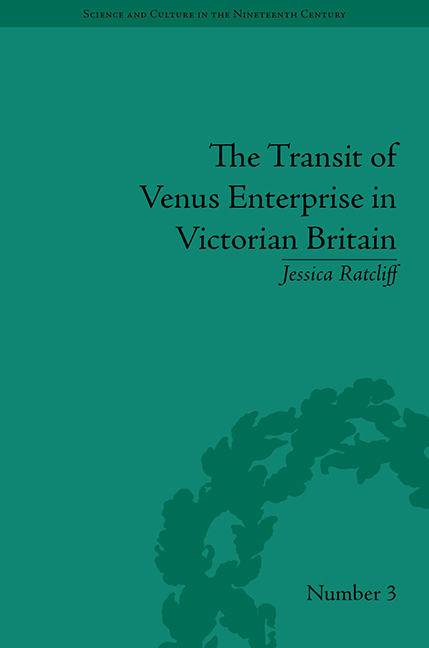Book contents
- Frontmatter
- CONTENTS
- Acknowledgements
- List of Illustrations
- Dedication
- Introduction
- 1 The Precedent: Transit of Venus Expeditions in 1761 and 1769
- 2 Big Science in Britain c. 1815–70
- 3 Noble Science, Noble Nation: The Establishment of Transit Programmes in Britain and Abroad
- 4 Inside Greenwich: The Preparations for 1874
- 5 The Expeditions
- 6 The Outcome
- Conclusion
- Epilogue: The Transit of 1882
- Notes
- Works Cited
- Index
2 - Big Science in Britain c. 1815–70
- Frontmatter
- CONTENTS
- Acknowledgements
- List of Illustrations
- Dedication
- Introduction
- 1 The Precedent: Transit of Venus Expeditions in 1761 and 1769
- 2 Big Science in Britain c. 1815–70
- 3 Noble Science, Noble Nation: The Establishment of Transit Programmes in Britain and Abroad
- 4 Inside Greenwich: The Preparations for 1874
- 5 The Expeditions
- 6 The Outcome
- Conclusion
- Epilogue: The Transit of 1882
- Notes
- Works Cited
- Index
Summary
It is the pride and boast of every Englishman to pay his taxes cheerfully when he feels assured of their application to great and worthy objects.
John Herschel (1845)Particle accelerators, space shuttles, the Manhattan Project – these are classic examples of ‘big science’. The term emerged after World War II as a label for the enormous scientific projects of modern times. It is sometimes hard not to see big science as a unique signature of the present day. But of course in a relative historical sense every period has had its own ‘big science’: intellectual or technological projects executed on what was a dramatic scale for the time. Historians, increasingly interested in the historical precedent for today's big science, have begun to talk about the ‘bigger science’ of previous periods. The eighteenth-century transits of Venus are a stock example of early big science. The nineteenth-century transits are not, but only because their story is less well known. In this chapter, the outlines of what was the big science of Victorian times will be presented. The large-scale research programmes of the period share similar characteristics, such as institutional settings, programme designs, public representations and types of personnel involved.
The bigger science of a period often was not the most significant or visible science in historical or even contemporary terms. For example, for the nineteenth century, Charles Darwin does not fit into this category. Neither does Michael Faraday or James Clerk Maxwell (and indeed it is largely through the lens of the history of laboratory physics that the belief that big science had no historical precedent was established). The big science of Victorian Britain has only a small place in the current historiography. And from within an account of big science in the nineteenth century, the entire landscape of scientific culture looks different. For example, from this angle the military emerges as the central institution of Victorian science. The Admiralty was especially influential on science in both cultural and financial terms. Currently however, military institutions are almost entirely absent from the historiography of Victorian science.
- Type
- Chapter
- Information
- The Transit of Venus Enterprise in Victorian Britain , pp. 21 - 34Publisher: Pickering & ChattoFirst published in: 2014



